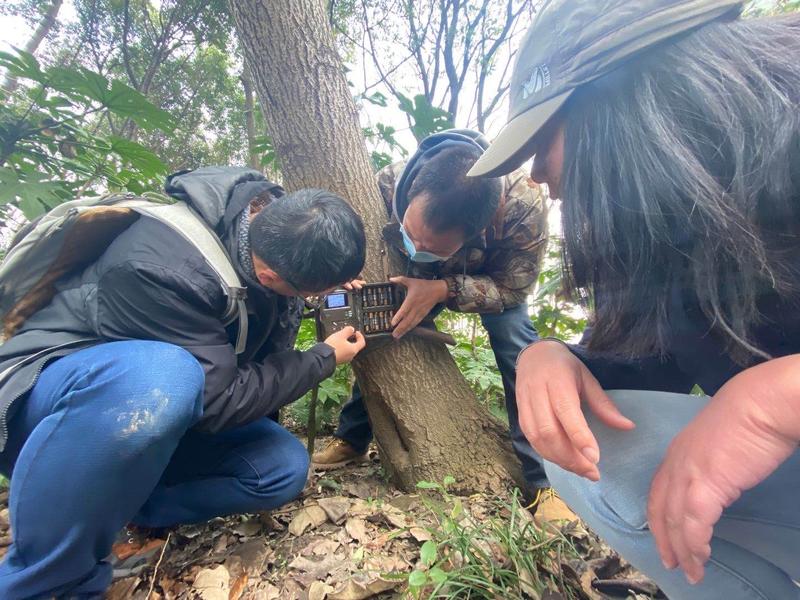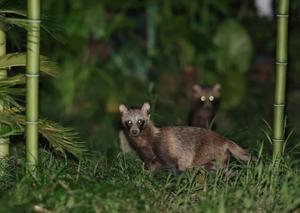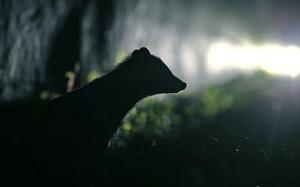Wang Fang is a man on a mission to build a better urban environment, as much for the wildlife population as the people.
 Wang Fang, an animal researcher in Shanghai, leads an investigation into the field that results in the discovery of raccoon dogs in the city's 137 residential quarters. (PHOTO PROVIDED TO CHINA DAILY)
Wang Fang, an animal researcher in Shanghai, leads an investigation into the field that results in the discovery of raccoon dogs in the city's 137 residential quarters. (PHOTO PROVIDED TO CHINA DAILY)
Wang Fang knew he should not have fed the raccoon, but he could not help it.
It was seven years ago when Wang was a post-doctoral student working for an office of the Smithsonian Institution in Virginia, the United States.
The unexpected guest knocked at the door of his laboratory, pawing his feet and leg and begging for food.
"As an animal researcher, I knew humans should never feed wild animals, but faced with this adorable creature, I couldn't help but grab some cat food for it," said Wang.
Human’s social and economic activities, such as the change of farming methods or people’s working patterns, greatly affect animals even more than natural environment conditions
Wang Fang, animal researcher
The raccoon returned a few days later, only to be chased away by a broom-wielding Wang who wanted to teach the animal that approaching humans for food can be dangerous.
Unfortunately, the raccoon did not learn its lessons. Several days later, the same creature broke into the lab, damaged a fridge and got itself electrocuted after chewing on a live wire.
"This incident taught me that we should not indulge our curiosity and spoil wild animals with human love as it can be deadly and harmful for both parties," he said.
With this particular incident leaving an indelible impression on his mind, Wang made it a point to study a similar looking creature-the raccoon dog-when he returned to China to work as a researcher at Fudan University in 2018.
Raccoon dogs first started surfacing in Shanghai's residential neighborhoods around 2001, though sightings were sporadic and they hardly caused any trouble. But in 2018, with their population having grown significantly, these animals were fast becoming a menace to society.
 (PHOTO PROVIDED TO CHINA DAILY)
(PHOTO PROVIDED TO CHINA DAILY)
Earlier this year in July, as many as 80 raccoon dogs were found in a community in Shanghai's Songjiang district. Some had even attacked residents.
"Frequent and large-scale human feeding has resulted in the surge of raccoon dogs in this community," Wang explained. He noted that such conflicts are not native to China. Raccoon dogs have also created headaches for farmers in Japan. Over in London, foxes can sometimes become a societal nuisance, too.
His investigation into this matter has led to the discovery of raccoon dogs in 137 residential quarters of Shanghai.
"The number is growing, and it could have hit 150 quarters by now," he said.
In September, Wang's research entered the second phase. His team will now place GPS collars on some raccoon dogs to help study how they travel between places, the human activities that have led to their proliferation, and the potential hotspots for conflicts between these animals and humans.
"We hope to know precisely what environment changes are needed to help human and wild animals coexist peacefully, what changes could benefit animals, and what kind of human activities, such as feeding, should be prohibited to protect animals," Wang said.
 (PHOTO PROVIDED TO CHINA DAILY)
(PHOTO PROVIDED TO CHINA DAILY)
These studies, Wang said, are part of efforts to build a detailed management plan for the city's biodiversity, which includes the monitoring of the density of several key species, and protocols for handling animals when their population gets out of hand.
Wang's focus on using mathematics to solve conflicts between human and animals started during his doctoral studies in Peking University when he accompanied his adviser to evaluate the impact of a new development project on the panda population.
Wang noticed that a lack of comprehensive data about panda's activities had resulted in decisions being made to build highways and railways that might damage panda habitats. He recalled that while construction companies could estimate just how much pollution the project would emit and how much GDP it would generate, they couldn't provide data on how their project would affect the behavior of pandas.
"I started to think that our understanding of wild animals should be quantified, so that it will be precise and repeatable, and with the increase of data and improvement of algorithm, our evaluation can get better and better," he said.
Wang later wrote a thesis describing panda's behavior through data and mathematic models.
 (PHOTO PROVIDED TO CHINA DAILY)
(PHOTO PROVIDED TO CHINA DAILY)
During his post-doctoral work at the Smithsonian Institute from 2012 to 2015, he studied more techniques of programming and spatial mapping related to this matter. Following this, Wang studied the integration of ecology with social sciences, policy and technologies during another post-doctoral stint at Michigan State University.
"Human's social and economic activities, such as the change of farming methods or people's working patterns, greatly affect animals even more than natural environment conditions," he said. "I want to connect all these factors through my research."
Apart from research, Wang also raises awareness about such issues through public speeches and articles on social media platforms, such as his WeChat account titled "The Surveyor of Nature" and his micro blog on Sina Weibo which has 180,000 followers.
During a recent environment festival, Wang talked about raccoon dogs and bats, debunking the misconception that bats are dangerous, and calling for a stop to the killing of this animal.
"It is the human invasion of bat habitats that causes viruses to jump from bats to intermediate hosts, such as cows and horses, and eventually to humans," he said.
"The pandemic has given people the false perception that bats are akin to demons. But urban animals like them are already a part of our city. Fearing them or feeding them are not the right ways to go about this relationship with them."
Lyu Siyao contributed to this story.


